Yves here. Forgive me for a long introduction to John Helmer’s discussion of German and Polish scheming over Germany’s hoped-for expropriation of Rosneft assets in Germany. The Russian government is not surprisingly exercised about these plans. But the Russian news coverage appears not to mention that Germany already did a big dirty to Russia, by seizing the assets of Gazprom’s German subsidiaries, which included storage facilities. Perhaps they did not want to call attention to the fact that Germany had already set a precedent of sorts.
And that precedent also includes Russia having made use of its “special retaliatory economic sanctions.” From a June 2022 post:
However, remember Russia’s retaliatory economic sanctions? The ones that seemed like a as if they had turned out to be a damp squib? From a May 12 post:
Russia published its initial list of parties subject to its “retaliatory special economic measures.” Putin established the program by decree on May 3, designed to address the unlawful taking of property and property rights by unfriendly parties. The order tasked officials to come up with targets in ten days and develop additional criteria.
We speculated that Germany’s seizure of Gazprom operations, which included storage facilities, would be a prime initial target. We were correct…TASS gives an overview:
The list includes 31 companies from Germany, France and other European countries, as well as from the USA and Singapore. In particular, it includes former European subsidiaries of Gazprom, traders and operators of underground gas storage facilities.
In particular, Russian authorities, legal entities and citizens will not be able to conclude transactions with the sanctioned entities and organizations under their control, fulfill obligations to them under completed transactions, and conduct financial transactions in their favor. This includes the concluded foreign trade contracts….
Now so far this is all very entertaining, but what does it mean? It appears Europeans in the gas and possibly also electricity business won’t know for sure until Russia counterparties tell them their contracts are cancelled or they otherwise won’t be doing business with them. Remember that the sanctions are sweeping in terms of subjecting all Russian individuals and legal persons to them. And their application goes beyond the entities listed to include “organizations under their control.”
It looks like Russia knew exactly what it was doing. Consider the impact of the most obvious step Russia would take under these sanctions, of no longer supplying gas to the stolen Gazprom businesses. From reader vao:
But there is more on the gas front in Germany, and costs for the German State are piling up.
Remember that story with Gazprom Germania taken over by the Bundesnetzagentur as trustee? Well,
1) After being placed under the administration of the Bundesnetzagentur, Gazprom embargoed supplies to its former German unit, i.e. Gazprom Germania and its host of subsidiaries storing and delivering gas in Germany. This means that GG has not yet managed to re-fill its storage tanks.
2) Furthermore, since GG had contracts to fulfil, it had to acquire gas elsewhere at much higher prices — which proved totally unprofitable, so much so that GG is nearly bankrupt.
3) The German government is now embarking on a reorganization to avoid the cessation of activities by GG. GG will be lent up to €10bn through the KfW to ensure the continuity of operations.
4) It is not yet certain whether the government will back the loan with a State guarantee, or whether it will convert it to equity (in which case the German State will become a shareholder of GG).
5) The trusteeship will be converted from October onwards to a permanent administration, and Gazprom Germania renamed to “Securing Energy for Europe GmbH”.
6) In another step, the Bundesnetzagentur has decided to grant a 40% rebate on the fees to be paid when feeding the German gas distribution networks from LNG supplies.
So it is not just the German industry and households that are feeling the pain because of high gas prices — the State budget is getting directly hammered as well because of the consequences of the spat with Russia.
Now admittedly Russia was able to mess with Germany (and Austria, it also refused payments from Austrian operations that were part of the seized Gazrprom entities) because Europe had not fully divorced itself1 from Russian energy. And recall this hurt because even though Europe might be able to round up enough LNG, that was at spot market prices, versus its old, lower long-term contract prices.
So Russia has set up the legal means to engage in economic retaliation. And it used them with the last biggish German asset seizure. But the response was targeted. What options does Russia have if the Rosneft seizure proceeds? Or if the Collective West is dumb enough to steal the frozen Russian central bank assets?
By John Helmer, the longest continuously serving foreign correspondent in Russia, and the only western journalist to direct his own bureau independent of single national or commercial ties. Helmer has also been a professor of political science, and an advisor to government heads in Greece, the United States, and Asia. He is the first and only member of a US presidential administration (Jimmy Carter) to establish himself in Russia. Originally published at Dances with Bears
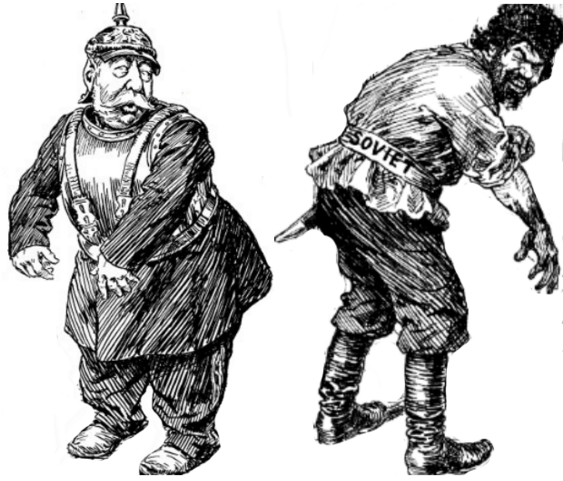
This is how the war in the Ukraine doesn’t end, not for the Germans and the Poles.
So long as they can, they plan to steal or destroy Russian assets west of what used to be Kievan Ukraine; and mobilize the US military bases in both countries to reinforce and defend their larcenies.
The German political party which promises to continue this war for the employment of German workers and the enrichment of German executives and shareholders will win the next election, replacing the Social Democratic Party and the Greens as the party of war.
The post-Ukraine strategy of the Stavka starts here — Ha Берлин! To Berlin!
On Friday last, the Russian language edition of the German state medium Deutsche Welle (DW) published a report of German and Polish government plans for the expropriation of PCK, the Rosneft crude oil refinery at Schwedt in northern Germany, and the Rosneft network of operating assets in Germany, Poland, and Austria.
The German assets of Rosneft, the Russian state oil production company under worldwide sanctions, had been placed under what the German government called “fiduciary management” by an “independent” state regulator in September 2022. This was announced at the time as a temporary arrangement to comply with the sanctions, renewable every six months, but leaving undisturbed the Russian ownership of the assets. This scheme was renewed at six monthly intervals, as Rosneft has reported.
There was nothing independent about the BNA or what it has been doing every six months. BNA stands for the Federal Network Agency — Bundesnetzagentur für Elektrizität, Gas, Telekommunikation, Post und Eisenbahnen. It claims to be “an independent higher federal authority with its main office in Bonn operating within the scope of business of the Federal Ministry for Economic Affairs and Climate Action (BMWK) and the Federal Ministry for Digital and Transport (BMDV). We have been responsible for Germany’s essential electricity, gas, telecommunications and postal infrastructures for over 20 years.”
“Within the scope of” is a German fig leaf for “under control”.
“Our task,” BNA says, is “to ensure fair and non-discriminatory competition for all market participants. Our success and our expertise in regulation led to the energy and rail sectors also being placed under our responsibility.”
This was not what the government of Chancellor Olaf Scholz intended when it commenced its takeover of Rosneft and assigned BNA the role of camp guard. BNA described what it was doing to “safeguard security of supply in Germany…on the basis of the Energy Security of Supply Act (section 17 EnSiG) until 15 March 2023. This basis enables the fiduciary to take action to keep the business running in accordance with its importance for the functioning of society in the energy sector. The fiduciary management may be extended under certain conditions… The decision to introduce fiduciary management was prompted by…by the sanctions imposed on Russia…The fiduciary management means that the original owner no longer has authority to issue instructions.”
MAP OF ROSNEFT’S MAIN ASSETS IN GERMANY
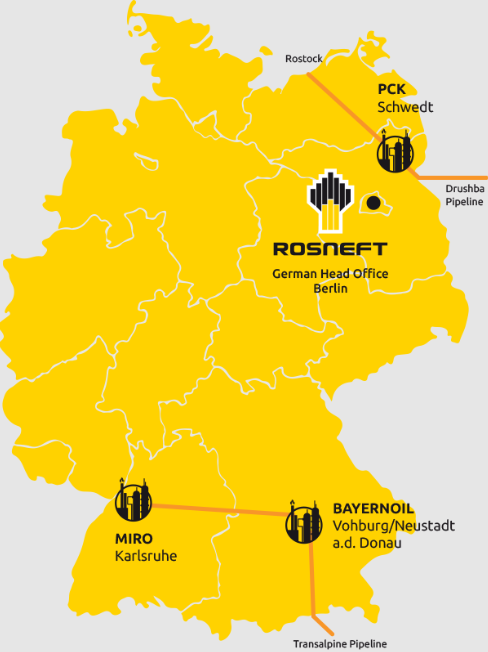
Source: https://www.rosneft.de/
According to BNA’s first “letter of comfort” at its takeover, “RDG has stakes in PCK Raffinerie GmbH (PCK) in Schwedt/Oder, Bayernoil Raffineriegesellschaft mbH (Bayernoil), Mineralölraffinerie Oberrhein GmbH & Co. KG (MiRO) and in various oil pipelines in Germany (Deutsche Transalpine Oelleitung GmbH), Austria (Transalpine Ölleitung in Österreich GmbH), Italy (Soc IT per I’Oléodotto Transalpino SpA) and France (Société du pipeline Sud-Européen SA). RDG has crude oil processed in the refineries PCK in Schwedt, MiRO in Karlsruhe and Bayernoil in Ingolstadt and is also responsible for distribution of the petroleum products produced in the refineries in line with its stake in each refinery and the crude oil processed there. RNRM [Rosneft Refining & Marketing GmbH] supports RDG [Rosneft Deutschland GmbH] as a service company and holds shares in AET Raffineriebeteiligungsgesellschaft mbH, which in turn holds shares in PCK. RDG and its associate RNRM, together hold a majority stake in PCK.”
“The business activities of RDG and RNRM are of decisive importance for the functioning of society in the energy sector and the maintaining of security of supply. Owing to the scope of its oil transactions and its various stakes in refineries and pipelines, RDG is a central company in Germany’s oil supply. The PCK refinery, which is operated jointly by RDG and RNRM, is one of the largest refineries in the Federal Republic of Germany and ensures a basic supply of petroleum products to the north-east of Germany and Berlin airport. RDG and RNRM thus fulfil key functions that are essential for the security of supply in Germany and Europe.”
In the new report from Deutsche Welle, it is now made clear that with the start of military collapse of the Ukrainian and NATO forces east of the Dnieper River, and the election of the Donald Tusk coalition to govern Poland, a scheme of expropriation has been prepared that will continue the sanctions war against Russia for the foreseeable future.
“Increasingly likely”, the phrase with which this report by Andrei Gurkov leads, is future tense and not yet a certainty. The debate inside and outside the Berlin Chancellery is reported here, concluding with the Scholz government spokesman saying it is “examining the possibility [of expropriation]. A decision has not yet been made.”
Rosneft has replied through its German law firm, Malmendier Legal, which has ties to the German Christian Democratic Union (CDU) party and to Moscow. “Such an expropriation would represent a measure that would remain unprecedented in the history of the Federal Republic of Germany and would forever damage investment security…As a listed stock corporation, Rosneft will take all measures to protect the rights of its shareholders.”
The Kremlin spokesman has announced: “This is nothing else than the expropriation of someone else’s property. These are steps that undermine the economic and legal foundations of European states, these are steps that absolutely devalue the investment attractiveness of these countries and have very deep consequences for those who make such decisions. We do not exclude anything to protect our interests and to counter the illegal steps that we are talking about.” Rosneft is already suing in Germany’s Constitutional Court against the BNA trustee management scheme.
The value of the Rosneft assets proposed for seizure is about $7 billion. The German newspaper Handelsblatt reported on February 9 that Rosneft chief executive Igor Sechin had sent a formal letter proposing that the German government buy Rosneft out at the market price. Habeck’s ministry has denied receiving such a letter.
Translated verbatim from the Russian original, the following report explains the strategic political and commercial calculations in Berlin and Warsaw. The map and illustrations appeared in the DW publication. The picture and caption of Vice Chancellor Robert Habeck in Warsaw on February 13, and the illustration and caption reporting the leadership purge at Orlen, the Polish oil company, have been added.
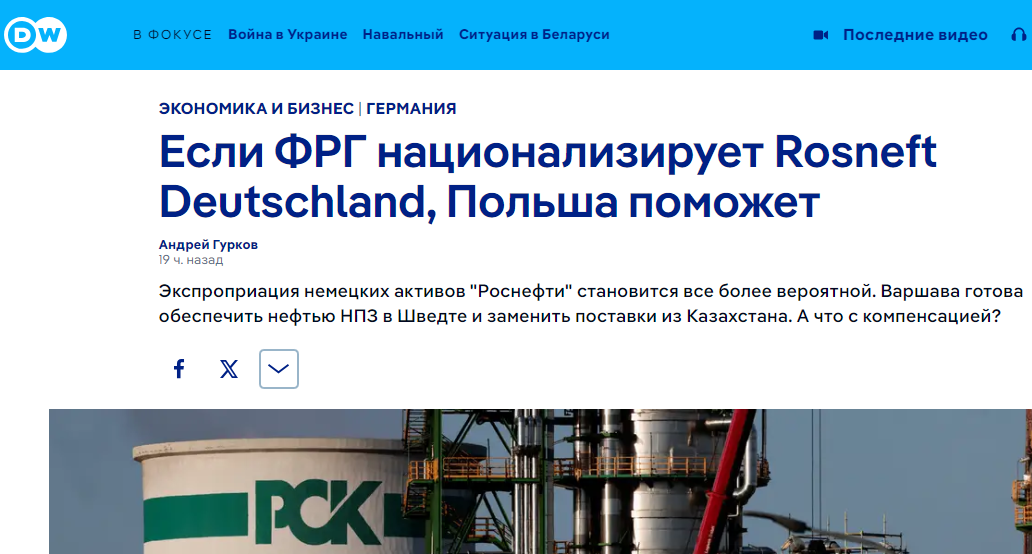
Source: https://www.dw.com/

February 16, 2024
Germany nationalizes Rosneft Deutschland, Poland will help
by Andrei Gurkov
Expropriation of Rosneft’s German assets is becoming increasingly likely. Warsaw is ready to provide oil to the Schwedt refinery and replace supplies from Kazakhstan. But what about compensation?
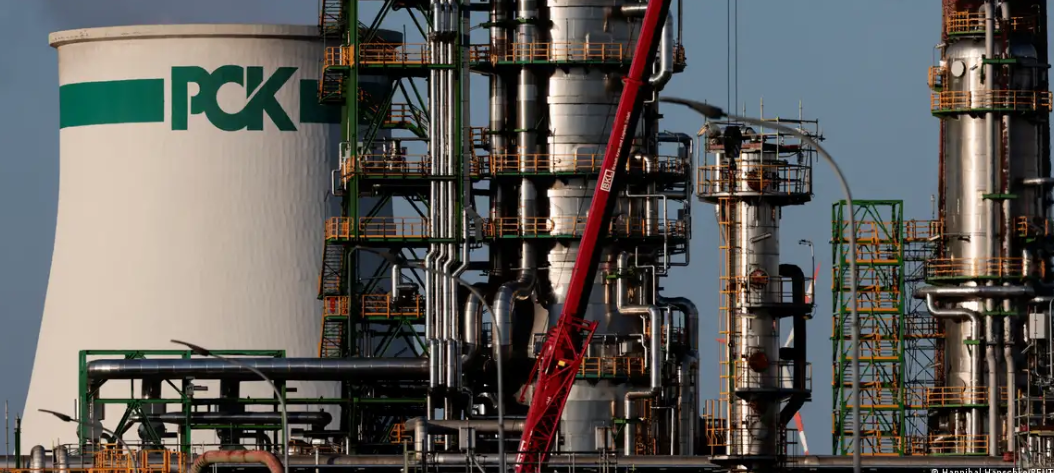
The PCK Raffinerie Schwedt refinery in Schwedt, Germany.
The nationalization of Rosneft’s German assets is becoming more and more likely, and new signals from Poland reinforce this impression. The German government is running out of time: on March 10, when the next decision on the transfer of Rosneft Deutschland under the so-called trust management of the state expires. Berlin, apparently, no longer wants to extend this regime introduced in September 2022 for six months, because they seek a stable, not temporary, solution to the fate of the oil refinery in Schwedt — PCK Raffinerie Schwedt.
Germany and Poland discuss the fate of the Schwedt refinery
This is exactly the case, although Rosneft has other assets in Germany. But in this refinery, the state-owned Russian concern actually owns 54%, and maintaining Moscow’s control over a strategically important enterprise seems to the German authorities to be too much of a risk, especially against the background of the growing threat from Russia. After all, PCK Raffinerie Schwedt provides petroleum products to a significant part of East Germany and, above all, to the capital of the country, Berlin, with its approximately four million inhabitants.
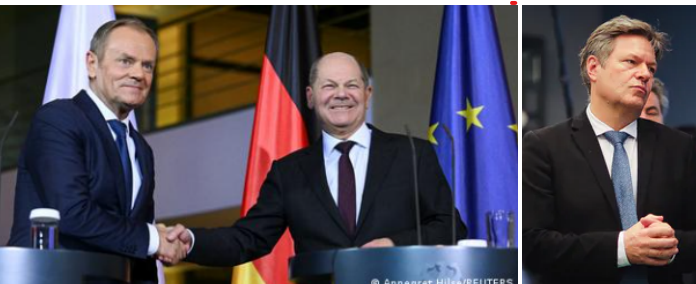
Left: Berlin, February 12, 2024: the new Polish Prime Minister Donald Tusk (left) visits German Chancellor Olaf Scholz. Right, Vice Chancellor Robert Habeck in Warsaw on February 13. For a report of his talks there, read this.
The intention of the German government to put an end to the legally suspended state of the plant has clearly strengthened after the recent elections in Poland. They brought to power a pro-European coalition, which German politicians trust much more than the previous Polish government. Relations between the two countries are currently warming rapidly, as evidenced by the talks between the new Polish Prime Minister Donald Tusk and German Chancellor Olaf Scholz in Berlin on February 12.
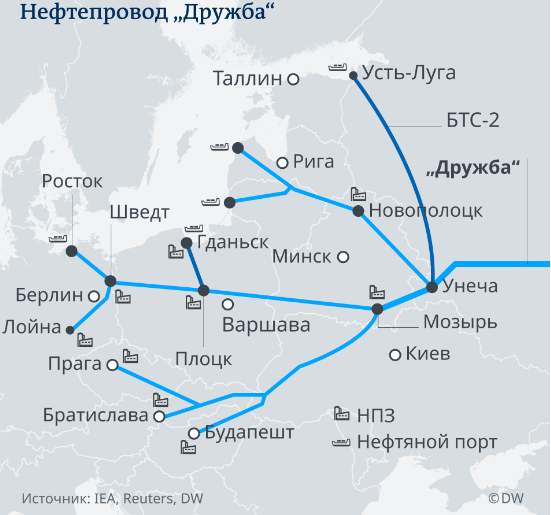
Therefore, the visit of Vice Chancellor and Minister of Economy of Germany Robert Habeck to Warsaw the next day, February 13, played an important, and perhaps decisive role in determining the next concrete steps with regard to Rosneft Deutschland.
“Poland has helped a lot in the past to provide oil to the east of Germany,” the German minister recalled after the talks and made it clear that in the event of the expropriation of Rosneft, the supply of the plant in Schwedt would improve, since the Polish side is ready to significantly increase the pumping of oil through its territory towards Germany from the port of Gdansk. According to the Reuters news agency, citing an informed source, Warsaw assured Berlin even before Habeck’s arrival that it would be able, if necessary, to completely replace the volumes of Kazakh oil currently flowing to Schwedt.
Warsaw: Oil from Kazakhstan can be completely replaced
Some explanations are needed here. Until 2023, this refinery, built six decades ago in the GDR on the border with Poland, operated exclusively on oil coming from the USSR and then from Russia via the Druzhba oil pipeline. In response to the full-scale Russian aggression against Ukraine, the European Union imposed an embargo on Russian oil transported by tankers, but not on supplies via the Druzhba pipeline system, since several Eastern European EU members are still heavily dependent on them. However, the German government decided for its part to completely abandon Russian oil.
Since last year, the Schwedt plant has been supplied with oil purchased on the world market in three ways. From the German Baltic port of Rostock via a longstanding and not very powerful pipeline that was originally laid down as a backup — through the Polish port of Gdansk, from where oil is pumped through Poland using the westernmost segment of the Druzhba, and from Kazakhstan in transit through the Russian territory on the same Druzhba.
Germany strongly emphasizes its desire to increase oil purchases in Kazakhstan, cooperation with which is becoming more intensive. However, there are fears that in the event of the nationalization of Rosneft’s German assets, Moscow will block the Druzhba oil pipeline as a retaliatory measure and thereby [stop] the supply of Kazakh oil.
But now the Polish side has assured Berlin, according to a Reuters source, that in this event it will introduce oil currently being pumped through its territory towards Sweden to 2.5 million [metric] tons per year, and thereby fully compensate for supplies from Kazakhstan. Their volume, according to the agency, now ranges from 1.0 to 1.2 million tons. So far, about 1.2 million tons of products purchased on the world market are passing through Gdansk. Theoretically, it could also be oil from Kazakhstan. At the same time, Warsaw made it clear to the German side that as long as Rosneft remains the main co-owner of PCK Raffinerie Schwedt, even if it is formal in terms of external management, there will be no increase in supplies through Gdansk.
There is no question of selling Rosneft Deutschland
It is noteworthy that articles in the German media about Robert Habeck’s negotiations in Warsaw, and in general about the future of Rosneft Deutschland, in effect do not consider the option of Rosneft selling this company and its assets. This is despite the letter with such a proposal, as the economic newspaper Handelsblatt wrote in early February, from the head of the Russian concern Igor Sechin to the German government. But Berlin, the publication concluded, “has placed its bet on expropriation.”
This is probably due to the fact that the implementation of a deal in Germany that would allow Rosneft and thus Russia which continues the war in Ukraine, to earn a multibillion-dollar sum, would be illegal due to international sanctions against the Russian Federation — or at least it would look extremely strange. It is also likely that under the conditions of the sanctions regime, there are simply no people willing to deal with a Russian state-owned company that falls under this regime, and thereby expose themselves to the risk of secondary penalties.
In any case, the Polish oil company Orlen, which is considered one of the most likely contenders for Rosneft’s stake in PCK Raffinerie Schwedt, will definitely not go for such a deal with the Russian concern, since gaining control of this refinery would fit well into its strategy of international expansion. In this context already, Orlen owns a large network of petrol stations in Germany. Moreover, it is Orlen which imports oil to Poland through the port of Gdansk. At the same time, it seems quite likely that the German government will first nationalize Rosneft Deutschland, and then, after some time, sell its stake in the Schwedt refinery to Orlen. This is despite the fact that last year the Bundestag created legal grounds for such a sale even without nationalization.
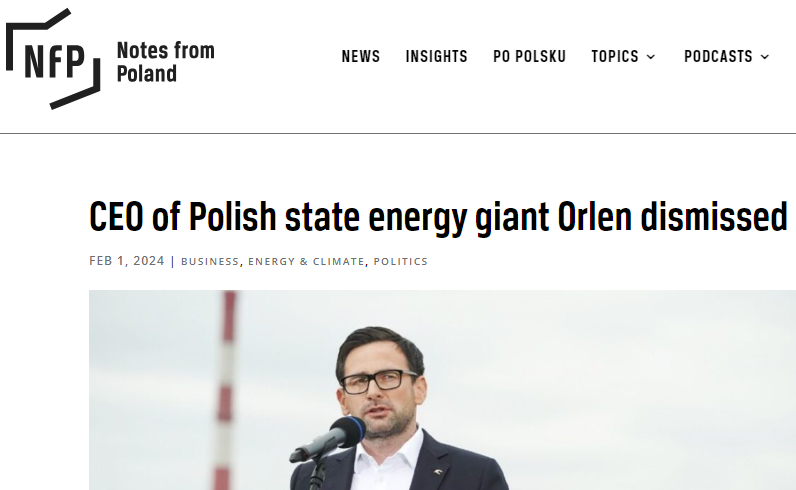
“Daniel Obajtek, the CEO of state energy giant Orlen – the largest firm in Poland and the entire Central and Eastern Europe region – has been dismissed from his position. He was a close ally of the former ruling Law and Justice (PiS) party and the decision to remove him comes amid a wider overhaul of management at state-owned companies under Donald Tusk’s new government, which took office last month. Obajtek oversaw an ambitious expansion of Orlen, resulting in it last year ranking among Europe’s 50 largest firms. But he also faced accusations that he used the firm’s resources to support PiS, including during its election campaign last year…Ahead of last year’s parliamentary elections, Orlen was accused of artificially keeping fuel prices low to help PiS’s campaign. The firm denied it, but prices began to rise again just days after the elections, in which PiS lost its majority. According to the former Orlen CEO Jacek Krawiec, the price cuts before the election may have cost Orlen a total of 5.7 billion zloty (€1.31 billion)… The market appeared to react positively to the decision to dismiss Obajtek. At noon, the firm’s shares were up almost 3.5% on the day, trading at 64.8 zloty a share.” Read more at https://notesfrompoland.com/
Rosneft will be able to claim compensation
According to many experts, the German government has created the legal grounds for the nationalization of Rosneft’s assets due to the need to ensure the country’s energy security back in 2022, making appropriate changes to national legislation. But German lawyers for Rosneft Deutschland have already stated that in the event of expropriation they will do their best to challenge its legality.
However, they will have a much better chance of success in getting compensation for Rosneft for nationalized property, lawyers interviewed by the Frankfurter Allgemeine Zeitung newspaper believe. Their statements are given in an article titled “Rosneft is becoming a legal risk for Germany.”
When Gazprom Germania was nationalized in 2022, Gazprom did not get compensation for the lost property, since the Russian concern first tried to secretly change owners, thereby violating German law, and then itself abandoned its German subsidiary. In the case of Rosneft Deutschland, there do not seem to have been such egregious violations so far, according to the newspaper’s sources.
 Therefore, in their opinion, the Russian side will be able to legally claim compensation in the international arbitration courts and, possibly even compensation for damages, and here the amounts may be even greater. Another question is whether the German state will have to pay a multibillion-dollar sum to a sanctioned Russian company right now, in the midst of the war in Ukraine. After all, court proceedings on such issues often last for years. It is possible that the German government is counting on this.
Therefore, in their opinion, the Russian side will be able to legally claim compensation in the international arbitration courts and, possibly even compensation for damages, and here the amounts may be even greater. Another question is whether the German state will have to pay a multibillion-dollar sum to a sanctioned Russian company right now, in the midst of the war in Ukraine. After all, court proceedings on such issues often last for years. It is possible that the German government is counting on this.
____
1 Yours truly cannot keep track of all the moving parts, but I believe Europe is still getting Russia oil that has been laundered in Indian refineries into end products.


“Forgive me for a long introduction to John Helmer’s discussion of German and Polish scheming over Germany’s hoped-for expropriation of Rosneft assets in Germany. The Russian government is not surprisingly exercised about these plans. But the Russian news coverage appears not to mention that Germany already did a big dirty to Russia, by seizing the assets of Gazprom’s German subsidiaries, which included storage facilities. Perhaps they did not want to call attention to the fact that Germany had already set a precedent of sorts.”
Hell, the United States already committed an act of war against Germany by blowing up Nordstream, but when you point this out to educated europeans, they look at you like you just audibly farted, or at best, they stare at their shoes and mumble something about how they must have somehow deserved it.
The German government seems to be making a bad situation worse and worse. It also shows Western double standards when other nations nationalize Western corporate assets and the West throws a tantrum, if not responding with outright regime change attempts. Now they are doing the same thing to the Russians.
One day this conflict in Ukraine will be over and Germany will still desperately need Russian natural gas. Liquid natural gas is several times more expensive than the pipeline gas and German industry, which was already losing ground to China, will continue to leave Germany, resulting in a catastrophic loss in living standards for ordinary German citizens.
By burning bridges with Russia more and more, the German government is making any reconciliation more difficult. Perhaps unless Germany sees a major change, like the AfD winning, it will continue down this path.
If the German people haven’t been made aware, Germany needs Russia more than vice versa. Russia is seeing its industry roar to life, which suggests that they may be better off without the West.
Germany by contrast needs cheap energy and the government of Germany is heading to a legitimacy crisis.
I think the neocons do believe that if they burn the bridges totally it’ll take decades to normalize the relations with Russia, but as far as I can predict, it only takes a change of some of the media, most of the government and then a proper “road to Canossa” (to Moscow, that is).
If and when Germany start treating Russia like it’s a superpower next door – that is, with respect – the gas and oil will flow again. There will be no preferential treatment, or return to the old, but it will be cheaper than spot priced LNG. Russian foreign and trade policy is much more utilitarian than the neocons can ever fathom.
The difference in price between LNG and gas delivered via pipelines is causing many other difficulties for the German government following the takeover of Gazprom Germania, as I explained a couple of months ago.
To summarize:
1) it is a globalized world, and despite its name, the activities of Gazprom Germania extended far, far beyond the borders of Germany;
2) as a result, unexpected problems are popping up in surprising places, causing SEFE (the new name of Gazprom Germania after its nationalization) to bleed even more cash,
3) and straining relations between Germany and other countries — in the current case, India.
A busted German middle class and desperate working class: no bad historical precedents there, I’d say!
its like a leit-motif throughout the West.
its almost as if our “leaders” want fascism to have a nice, well watered seedbed.
The german political class appears to be composed of more upmarket catspaws than the bands of angry young men recruited in Eastern Europe, but catspaws nonetheless (on the youngish side too). While they don’t lead street fights or smash political opponents, they do unleash chaos, instability (and opportunities) in their own nation at the behest of foreign interests. The whole Western political class seems riddled with such recruits, to the extent I wonder if there aren’t entire schools where the angry youth are sent off to the likes of Azov and the cunning are shipped to the likes of the WEF.
This could turn very interesting. Similar to the plans to seize Russian central bank funds, there are pretty bad long term consequences to doing this. Even if Germany can find a legal fig leaf to cover asset seizure, it will be a clear signal to foreign investors that their investment is subject to nationalization on a whim.
I wonder about the pushback from the business community, especially financial interests. Germany has been trying to push Frankfurt as a world banking center and attract global banking business decamping from London. These kind of decisions would make people think twice about investment and banking in EU.
Refineries and pipelines without owning the oil and gas, seems a pretty precarious strategy.
Rule Number 1. in the How to Burn Bridges Book.
Do not light the fire while you are on the bridge.
A busted German middle class and desperate working class…
[ There is no reason to think either of these assertions are correct, and this is a reason Germany government policy has so little active opposition. German employment has been protected since 2020, along with Germany real wages. That the German economy is faltering does not mean German workers are not being supported. ]
https://fred.stlouisfed.org/graph/?g=KSys
January 15, 2018
United States, Germany, France and Netherlands Employment-Population Ratios, * 2007-2023
* Employment age 25-54
https://fred.stlouisfed.org/graph/?g=REq7
January 15, 2018
Private Sector Real Hourly Earnings for Germany and France, 2017-2023
(Indexed to 2017)
[ Notice that the employment-population ratio for German prime age workers is over 85%. Earnings are significant for German workers. There has been a fine insulation against the economic slowing. ]
so the EU is now a pirate queendom?
how intersectional!
ive had the feeling for a while…largely badly articulated and amorphous…that the checkmate will be the ROW just ceasing to do bidness with us.
call it an embargo, or whatever you like….there’s no international law that requires…say, China, to sell the USA their stuff.
or to take US$ in return.
the west in general…but led by the usa…is a bad person…and not to be trusted.
this has been obvious to all and sundry abroad for a long time(see the publications over time of the nonaligned movement, for a peek)…but now, an alternative is emerging(negating Thatcher’s TINA).
domestically…and regarding this distrust…its unevenly applied, which is still remarkable, to me; the right leaning small C run of the mill redneck folks around here all hate the fedgov…and most of them hate austin…and are suspicious of gooberment in general.
and they are increasingly critical of giant multinational corps(e)….(and have no choice any more than to spend money at walmart)…but mention that USA! just maybe might be the bad actor in all of this…over a long, long time…and out come the flags to wave …and with which to stab me with,lol.
weird.
its gonna take a lot more perfidy and evil, applied to us’n’s, to break through those unconscious barriers.
Yeah absolutely, no one’s forcing China to sell their stuff in the US market… But they do keep expanding their presence in Mexico, to take advantage of that whole NAFTA thingy.
What does that tell you about the Chinese/does that tell you anything about the Chinese?
Just bidness, or all bidness?
Are they givin US the bidness?
And what bidness is it of ours, anyway, to ask?
Sent from my Chinese made phone.
I think John Helmer doesn´t quite understand the situation. It´s not surprising when you consider that he includes in his article an automatic translation of “Schwedt – town and the seat of the refinery” to Sweden (the country). The most important fact about the OIL (and not GAS) refinery in Schwedt is that it runs on RUSSIAN oil. Refineries can´t just profitably use any oil. They need SPECIFIC oil. Theoretically you could use oil from other places in the world but you need to get the oil there. We´ll get to that later.
Schwedt has been using Russian oil for more than 40 years. From there the whole GDR (and a good chunk of Poland) was supplied. The refinery was modernised after unification and still supplies Berlin and East Germany. So what happened?
In a nutshell our completely useless goverment agreed to be a good citizen of NATO and not only forego gas from Russia but also oil from the pipeline to this very refinery in Schwedt that is owned by Rosneft.
To late they realised that the good citizens of East Germany would have no more gas for their cars. Hence the “Kasakh” oil. This completely fictitious of course. It is the same Russian oil and everybody knows but nobody talks about it.
To repeat: the refinery in Schwedt is existential for Germany. There are no two ways about it. There is no refining capacity in Germany that can replace Schwedt.
The “Kasakh” oil solution was found because Schwedt is to far inland to get supplies of similar oil from overseas. The only possible alternative was through the Polish pipeline network connected to the port of Gdansk. The Poles though wanted to get ownership of the refinery in return. The Germans therefore continued to get Russian oil that was declared to be “Kasakh”.
What has changed with the new government in Poland I don´t know. Our economic ministry has been taken over by ideologues and Russia haters. Possibly they didn´t want to deal with the “homophobes” of the previous Polish goverment. I don´t know what is going on and why they don´t continue to simply run the refierney with “kasakh” oil.
great post & follow-on post – Tom67
One last little item: basically the German government is now prepared to grant the new Polish goverment what was denied the previous Polish goverment. That is ownership of PSK in return for supplying it with crude from Gdansk. Good question wether Gdansk can supply that much (and the right oil) in the first place. Seemingly the EU has decided to double down in its suicidal economic wr against Russia. And since there´s a new woke government in Poland they get the goodies that was refused the old one. Crazy stuff.
Crazy stuff indeed. The pretended Kazakh oil is the Urals that was feeded to PCK for 40 years, no doubt. But the other routes that feed the refinery today are either the port Gdansk which provides oil from “market” which can mean anything, for god’s sake also from Ust-Luga a bit further east in the Baltic Sea. The old pipeline from Rostock awaits refurbishment which will amount to ~ € 400 Mio, and upto that will not be a reliable and sufficient supplier. So the officials try to convince us that PCK runs well above the profitable level of 70% of capacity. One must know that all refinery need fodder round the clock, and this may not fall under 50% due to technical necessities.
As far I can see the minister for “Wirtschaftswunder” Habeck made promises to the Polish, by which they can overtake the 54% stake of Rosneft if they promise the full delivery of PCK through Gdansk port which they today hardly can handle. Nobody will see the implications that our Polish “friends” will be able to dominate the oil market in Eastern Germany in extenso, not to say monopolize. Let’s say they at least make a killing by selling oil of doubtful origin coming through the only feasible pipe in their hands. What a wonderful dependency we do have!
Drushba means friendship!
With Rosneft, not so much. We will find out when we have to stand the court and the Polish friends will dictate the price for the stolen equities, later.
Very interesting! Any theory why this crazy shit is going down now?